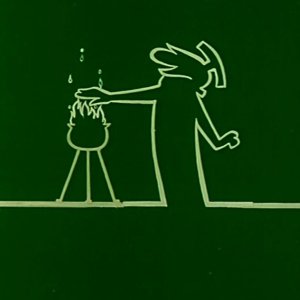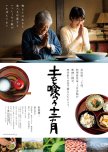Esta resenha pode conter spoilers
I should have liked the film, I wanted to love it -- but there was one major thing that annoyed me so much I even dreamed about it the following night. I tried to keep this review spoiler-free anyway, but I don't think I managed.
For the most part, the film just shows an old man (Tsutomu) gathering vegetables from the hill and from his field, cooking and eating them; and writing a book. Alongside this, we hear his thoughts about food, and about life -- his own life and how it shaped him specifically. In the film, what we hear is what Tsutomu is writing -- it's probably the essay the film is based on.
It's an interesting choice, to take an essay with Zen thoughts about life and try to turn it into a film -- and until the one hour mark, it works.
We see the season change, the landscapes and the vegetables change with them. Occasionally, the man's quiet life connects to the outside world -- a visit by his editor, by a carpenter, or when Tsutomu visits his mother-in-law.
I liked that part, I was looking forward to see the rest of the seasons. Even the motive of death, which was introduced at the end of the first hour, was fitting -- life and death are interconnected, which is why we like to eat together after a burial or a wake. I even liked the change of pace then, that death made Tsutomo's life more hectic -- that is a beautiful juxtaposition.
But after the scare he gets, his voice-over thoughts start to sound like those motivational quotes on greeting cards / calendars / facebook posts -- every single sentence has this feeling to it. This is no longer like the flow of thoughts of an old man, with some deep thoughts and some more personal observations, it's more like a compilation of "The Best of Zen" you could buy in the gift section of a book store.
I would have liked it much better if there had been more silence in this part of the film, only occasionally enhanced by a single sentence or thought.
Since this film is based on an essay, I suppose that everything we hear in the voice-over is from the essay, and that everything from the essay is in the film -- so unless either the film is longer or parts of the essay had been cut, there wasn't much else to do.
I'm also not too impressed with the relationship between the man and his editor -- is it friendship? Something romantic? It's implied that it's the latter, but the apparent age gap and some other smaller things make it strange.
Let's go back to the good things:
I loved the acting and the looks of the main character. Tsutomu is just an older man who is living his life. I like that he looks just like an ordinary man. With just a few changes in his movements, the actor shows us the change from the sprightly man who ambles through the woods and chases after pigeons to the elederly man who feels as if he's at death's door.
I also loved watching nature change from month to month -- and whenever I met the little frog again, I thought "Hello friend, there you are!" -- and also how the ingredients and the food preparation was filmed, which is something Japanese dramas or movies excel in.
And then, the last few minutes had everything I loved about the film, we also went full circle; but not quite -- as the year is complete, and things go back to the start, we'll have changed and the new year will be the same, and different.
For the most part, the film just shows an old man (Tsutomu) gathering vegetables from the hill and from his field, cooking and eating them; and writing a book. Alongside this, we hear his thoughts about food, and about life -- his own life and how it shaped him specifically. In the film, what we hear is what Tsutomu is writing -- it's probably the essay the film is based on.
It's an interesting choice, to take an essay with Zen thoughts about life and try to turn it into a film -- and until the one hour mark, it works.
We see the season change, the landscapes and the vegetables change with them. Occasionally, the man's quiet life connects to the outside world -- a visit by his editor, by a carpenter, or when Tsutomu visits his mother-in-law.
I liked that part, I was looking forward to see the rest of the seasons. Even the motive of death, which was introduced at the end of the first hour, was fitting -- life and death are interconnected, which is why we like to eat together after a burial or a wake. I even liked the change of pace then, that death made Tsutomo's life more hectic -- that is a beautiful juxtaposition.
But after the scare he gets, his voice-over thoughts start to sound like those motivational quotes on greeting cards / calendars / facebook posts -- every single sentence has this feeling to it. This is no longer like the flow of thoughts of an old man, with some deep thoughts and some more personal observations, it's more like a compilation of "The Best of Zen" you could buy in the gift section of a book store.
I would have liked it much better if there had been more silence in this part of the film, only occasionally enhanced by a single sentence or thought.
Since this film is based on an essay, I suppose that everything we hear in the voice-over is from the essay, and that everything from the essay is in the film -- so unless either the film is longer or parts of the essay had been cut, there wasn't much else to do.
I'm also not too impressed with the relationship between the man and his editor -- is it friendship? Something romantic? It's implied that it's the latter, but the apparent age gap and some other smaller things make it strange.
Let's go back to the good things:
I loved the acting and the looks of the main character. Tsutomu is just an older man who is living his life. I like that he looks just like an ordinary man. With just a few changes in his movements, the actor shows us the change from the sprightly man who ambles through the woods and chases after pigeons to the elederly man who feels as if he's at death's door.
I also loved watching nature change from month to month -- and whenever I met the little frog again, I thought "Hello friend, there you are!" -- and also how the ingredients and the food preparation was filmed, which is something Japanese dramas or movies excel in.
And then, the last few minutes had everything I loved about the film, we also went full circle; but not quite -- as the year is complete, and things go back to the start, we'll have changed and the new year will be the same, and different.
Esta resenha foi útil para você?


 4
4














